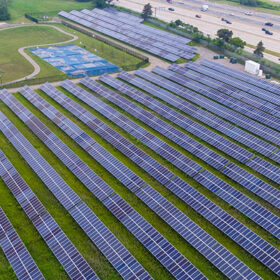The latest analysis from Rocky Mountain Institute (RMI) energy expert Kingsmill Bond showed that fossil fuel demand in the electricity sector has already reached its peak in demand. Driven by lowered costs, clean energy goals, and a gravitational shift in global capital toward renewables, solar and wind energy are expected to carry the torch left behind by coal, oil, and gas.
Technology adoption often follows a model called the S-curve, where exponential growth is experienced as a technology takes over as the highest-demand available option. This exponential growth ends when a preferable alternative technology is made available and the legacy technology plateaus in demand.
Bond said that this has already happened for fossil fuels in the electricity sector. In fact, his analysis shows that fossil fuels in the electricity sector reached peak demand and is now bouncing along a plateau before its inevitable decline in the back half of the decade.
According to RMI research, fossil fuel demand for electricity has peaked in 95 % of the Organization for Economic Cooperation and Development (OECD) countries and 31% of the non-OECD countries excluding China. China is on track to reach its 2030 solar and wind deployment targets by 2025, meaning the nation has also likely approached its peak in fossil fuel demand.
RMI said OECD demand for fossil fuels peaked in 2007, coal demand in 2013, industrial demand for fossil fuels as energy peaked in 2014, and internal combusion engine car demand in 2017. By 2019, 58% of the world experienced peak fossil fuel demand. In 2019, renewables met 85% of the growth in energy demand.

“Electricity is the largest demand sector for fossil fuels,” said Bond. “The peak here marks a key turning point in the energy transition and gives us hope that we can hit the goals of the Paris Agreement.”
The research is part of an ongoing series of reports tracking the energy transition called Peaking: The Series.
The report demonstrates how change increases over time, often leading to exponential growth. In 2011, the world struggled to sell 29 GW of expensive solar panels, in 2021 it deployed 182 GW, and by 2031 the industry is gearing up to sell 1,000 GW, said RMI.
“Putin’s War, the desire for domestic energy sources, and high fossil fuel prices only add to the pressure to change,” said Bond. “When we add up deployments in solar, wind, EVs, heat pumps, and hydrogen, we expect clean technology deployment over the course of this decade to replace four times as much fossil fuel demand as it did in the past decade.”
Bond said efficiency is another driver in the transition. Fossil fuels are relatively inefficient, requiring 10% of their energy to extract and process them, and up to two thirds of the available energy is lost in thermodynamic losses. Renewable technologies offer greater efficiencies. An electric vehicle uses about one quarter of the amount of energy as an internal combustion engine, solar is 2.5 times more efficient than coal, and a heat pump uses three times less energy than a gas generator.
“As these superior solutions enter the market in size, they will increase global efficiency gains by nearly 1 % a year and drive primary energy demand growth toward zero,” said Bond.
(Read: “Kentucky’s largest solar project to be built on former coal mine” and “Oil pipeline giant’s 164 MW solar project is underway“)
The exponential growth of renewable energy is currently underway. By 2024, renewable energy capacity is expected to be twice that of the total cumulative installed capacity in 2019.
Meanwhile, global analysts are joining RMI in the conclusion that fossil fuels have already passed their heyday. DNV of Norway was the first mainstream forecaster to make this conclusion, and the International Energy Agency (IEA) argued in its 2022 World Energy Outlook that the fossil fuel plateau has been reached.
“The stone age did not end for want of stones, nor the horse age for lack of horses,” said Bond. “The fossil fuel age of hunting for finite fossil stocks is giving way to the renewable age of farming infinite renewable flows. Superior renewable technology is winning the battle for the future of energy, and it is time to recognize this key turning point. Countries, companies, and investors that accept and embrace the energy transition will prosper, while those that deny and resist will struggle and eventually fall.”
This content is protected by copyright and may not be reused. If you want to cooperate with us and would like to reuse some of our content, please contact: editors@pv-magazine.com.








Thank you, again – will carry around in pocket. Very helpful for keeping me from boring people to smithereens about modular, Microgrid solar development with help of state, fed and IRA money. The other “Solar”, like what came in with corporate and BLM promotions in the passage of 2020 NV SB 358, is what has already timed out, and should not be allowed on remaining “biological refugia” wildlands. Microgrid can work anywhere now. No more solar “The only way it can work””right!” – For utility scale monopolistic 1872-1976 corporations’ culture.
Thanks for this insightful piece of information. I doubt if countries or companies would ever resist this impactful change that renewable energy technology intends to bring to the world.